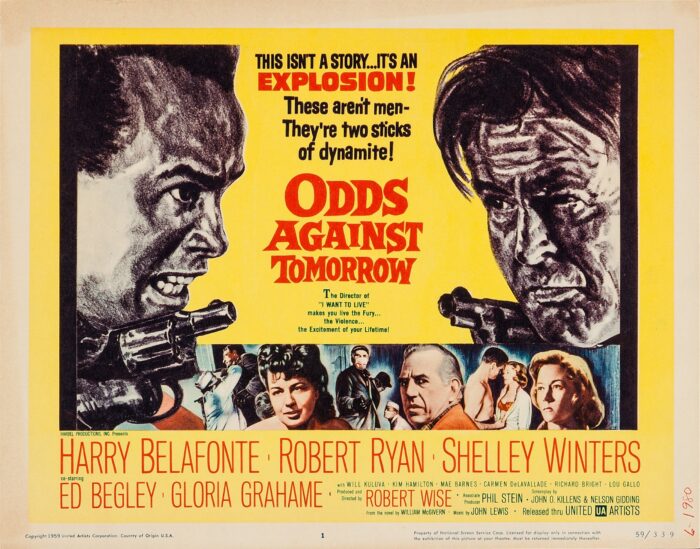
At the point when it came to the progression of Individuals of color, Harry Belafonte was a lion.
Companions and admirers communicated that feeling and more when insight about his passing was reported recently.
As an extremist, champion and sponsor, Belafonte was fundamental to the advancement and supportability of the social equality development — a reality that is legitimate. In any case, a less popular part of his heritage was the way his backing stretched out into his expert life as a movie producer. Dark portrayal and proprietorship made a difference to Belafonte, particularly in film.
Because of a 2009 meeting he did with The Chicago Safeguard, perusers got a brief look into his inspiration driving creating and featuring in a 1959 film that was being displayed at a neighborhood celebration around then.
Belafonte’s ‘Odds Against Tomorrow’

That film was designated “Chances Against Tomorrow,” which he created freely through his own organization HarBel. White Oscar-winning chief Robert Wise (“Westside Story,” “The Sound of Music”) helmed the film, which included eminent white entertainers Ed Begley and Shelley Winters.
It was his assertion to Hollywood and filmgoers that Dark movie producers can autonomously produce convincing movies that include completely understood and thoughtful Dark characters.
He likewise let the Protector know that he made “Chances Against Tomorrow” to make up for a shortcoming.
“I made it since I felt that in the African American population of culture, we were most fruitless in the presentation of possession and in the showcase of command over decision, and we expected to make motors that would foster the ability to take this issue in the African American population… and foster a philosophy that would assist us with turning out to be more free of the Hollywood framework, maybe even with the assistance of the Hollywood framework… .”
At the point when “Chances Against Tomorrow” was surveyed in the New York Times, a pundit composed that it was “a sharp, hard, thrilling drama.” It was selected for a Brilliant Globe in 1960 for “Best Film Advancing Worldwide Comprehension.”
The storyline fixates on a fallen cop who enrolls a white ex-con and a Dark club vocalist, played by Belafonte, to perpetrate a wrongdoing. Notwithstanding, when one of the white burglars coordinates his perniciousness and bigotry toward Belafonte’s personality, it takes steps to obliterate their arrangement and, eventually, their lives.
Upon its delivery, “Chances Against Tomorrow” worked up discussion since it stood up to moviegoers with hard bits of insight about American life as opposed to giving idealist diversion — a reality Belafonte recognized in his meeting.
“Certain individuals cherished it, clearly. A many individuals didn’t on the grounds that they felt it wasn’t the manner in which Individuals of color ought to look on the screen. Having this race struggle on the screen around an escapade plot was for them very outsider,” Belafonte said. “(Being made) cognizant about friendly disparities was an unforgiving pill for them to swallow since they were not exclusively being engaged, they were likewise being offered that would be useful of heart.”
The Battle for His Representation
For sure, onlookers saw that film and Belafonte’s development of HarBel as notable. It was the principal creation organization began by an African American working in Hollywood.
A New York Times article from Walk 15, 1959, pronounced that Belafonte shaping his own creation organization “could end up being perhaps of the main improvement in the American Negro’s tedious battle for equivalent portrayal on the country’s film screens.”
Belafonte would proceed to deliver more movies under HarBel. In any case, the battle for equivalent portrayal in film, a battle excessively huge for any single movie producer, keeps on persevering right up ’til now.
Belafonte said that even in the new thousand years, where great free motion pictures were being made, there actually weren’t an adequate number of Dark stories let by Dark movie producers know that engaged our sensibilities.
“The dark experience has large number of stories to be told, and you never rehash the same thing. Furthermore, when you stretch out that to the obscurity of Brazil, the Caribbean and Africa, you have a universe to discuss, however we’re actually distracted with ensuring that white individuals are engaged.”
Eventually, The Safeguard interview showed that Belafonte really focused as much on Dark progression in film as he accomplished for it on the ground through the development.
At the point when found out if he triumphed ultimately any final words, he finished the meeting with this:
“I think Dark America has a long list of motivations to think emphatically. There’s such a lot of that is in our grip, and we have such a lot of force as a group. We simply should comprehend that we have that power and shape it into a more amazing asset for our freedom than we’ve had the option to do as of recently.”